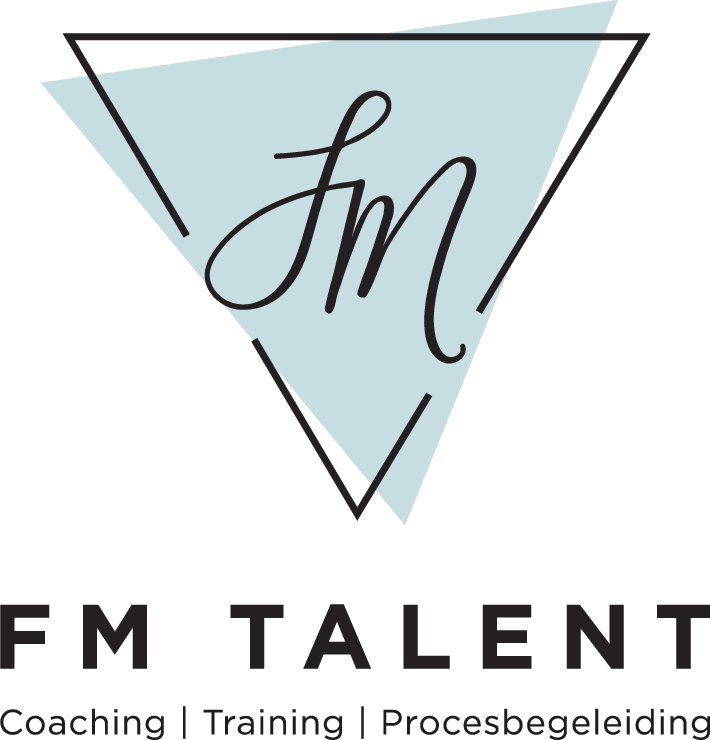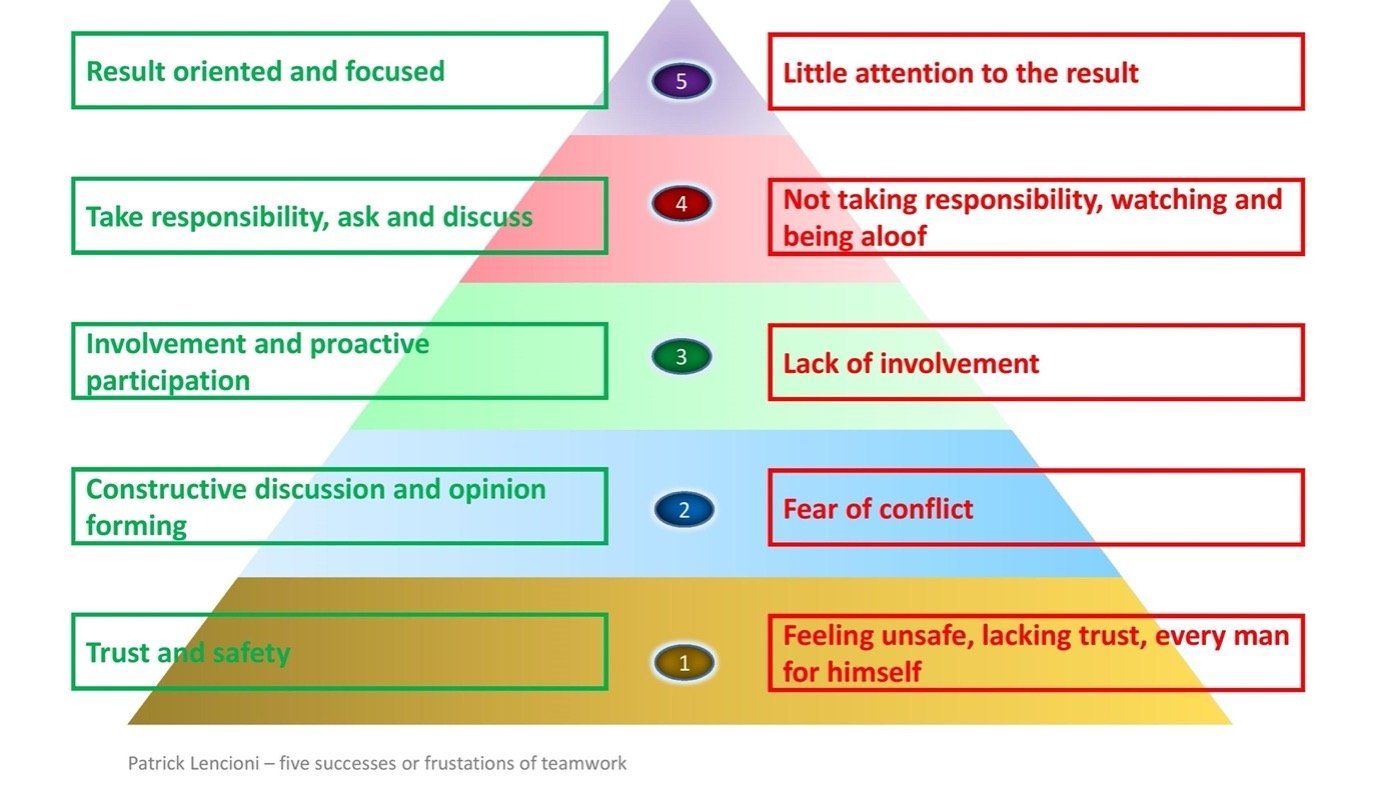Working methods
Methods
After initial contact with my clients, I work based on trust and set mutual agreements. During the intake I outline an approach and based on this we make agreements. Those agreements about everyone's role and the results are always leading and we record these in a contract.
I believe in a transparent working method that is clear and offers room for adjustments, if a situation requires that.
What characterizes my method?
During skills training I work according to the method of 'experiential learning': Demonstrate what you can, then reflect on behaviour, add theory and practice with new behaviour. This speeds up the learning process. We immediately experience the effects of new behaviour. I quickly create a safe setting and challenge people to learn, even when it creates some tension. With focus I have a good view of interaction and group dynamics. I observe and consciously choose my interventions that are of value to the group. With targeted feedback I create progress in the learning process. I guide substantive and interpersonal conversations in a practical, goal-oriented, neutral way. I offer tools to make complexity 'simple' in practice. I work with a well-considered balance between attention for relationships and attention for results. The combination of facilitating, insight into interaction between people and organizational knowledge characterizes me. My curiosity about the real task of leaders, a team and organizational ambitions reaches far. Every voice is worth hearing. In doing so, I address people's responsibility to enter into a discussion together. The working methods that I choose are always safe and active, so everyone remains involved.
My working method is based on methods that have been scientifically researched.
The research and ideas of Arend Ardon (Break the circle and Slow Acceleration), Berne (Transactional Analysis), Systemic Work (Hellinger), Ivo Brughmans (Paradoxical leadership), Patrick Lencioni (Dysfunctions of a team), Deep Democracy (Lewis), Non Violent Communication (Rosenberg), Talent Motivation Analysis (TMA), MBTI and Insights Discovery, and Harnish (Scaling up) are sources of inspiration.
I learned a lot from listening to others, reading, performing relevant education, experimenting and reflecting. After the first contact with my clients, I work on issues, based on trust. Learning and improving interaction between people is always important .
-
Transactional Analysis and Systemic Work
Transactional Analysis (TA) makes people aware of personality, behaviour, communication and group dynamics. Experiences gained early in life can determine the way in which you make 'decisions', which influence your personality and your behaviour. This is also known as your script. Working methods from the TA reveal communication patterns between people in groups, relationships and organizations. By providing insight into these patterns, you learn to choose more consciously for effective behaviour, increase your autonomy and communicate more effectively. With Systemic Work we look at the dynamics in a team or organization, that are in the system, 'the systemic laws'. In addition to individual people, you can look at dynamics between roles and layers within organizations. Awareness of the powers of the system opens up possibilities for influencing.
-
Deep Democracy
Deep Democracy is a practical method that makes group dynamics visible and allows you to intervene. The focus is not on the individual, but on the group as a whole. Contradictions and conflicting opinions are investigated in a respectful manner. The group has a group conscious and a group unconscious. The latter holds the potential and wisdom of the group. We want to reach this by creating a safe environment where all things that need to be said can be said. This ensures that the group conscious grows and that we gain more information about what goes on in the unconscious of the group. If it is not safe enough to speak in a group, we will not be able to get optimal information. With techniques from Deep Democracy, every voice is heard. After some friction, a connection is created, appreciation for other views and supported decisions. This contributes to the decisiveness of a team; Techniques from Deep Democracy ensure more mutual trust and the use of wisdom from the team.
-
Paradoxical leadership
Dealing effectively and inclusively with contradictions, tensions and dilemmas is one of the most important challenges of our time. Ivo Brughmans teaches us to think from 'Either – Or' to 'And – And'. For example, your environment requires more and more customization, but the organization mainly wants to work according to standardized processes. You want your team members to abide by the rules and procedures, but you also want them to show guts and entrepreneurship. You want to collaborate with other disciplines in the chain, but you also want to maintain your own focus and identity. You want to speed up your change process, but also involve all stakeholders. Every day there is a field of tension between opposing approaches and you often feel the need to make an 'unambiguous choice' because that provides clarity and guidance. But does this lead to effective and sustainable solutions? Paradoxical leadership is about harnessing the power of opposites. An art that requires personal mastery and in which you can really make a difference.
-
Talent oriented approach
Coaching with a talent oriented approach teaches you what your talent is, what its value is and how you can use it. In an effective team, we see that the team members are aware of their talents and can use the differences. It is precisely the differences that are of value. These differences usually also make it difficult to work well together. It is the job of both a leader and every team member to value and utilize that diversity in the team. A talent-oriented approach at work requires a basis of trust in the team, because you also have to be able to express what you are not so good at. I am TMA (Talented Motivational Analysis) accredited.
-
MBTI and Insights Discovery
With MBTI and Insights Discovery you gain insight into your personality and your areas for development by means of a questionnaire. This teaches you to expand your behavioral repertoire, the differences with others and the possibilities to improve communication with others. For groups this can bring tremendous insights in the acceptance of differences and building trustworthy relationships. I am MBTI certified for all levels, including teams. I am Insights Discovery accredited.
-
Scaling up
Leaders play a vital role in organizational success. The success or failure of organizations is a combination of attention to effectiveness (doing the right things with the right people) and efficiency (doing things right) with appropriate leadership. According to Verne Harnish, the four decision areas leaders face are: People, Strategy, Execution and Cash. He offers practical tools for leaders. His advice is: Limit the time you spend operationally as management, but focus on the market and ensure that everybody is moving in the same direction during implementation.
-
Thoughts of Patrick Lencioni
Trust is the foundation of an effective team. Lencioni's Team Model lists the 5 ingredients that a Trusted Team possesses:
1. Trust and safety
2. Having constructive discussions and conflicts
3. Involvement and proactive participation
4. Taking responsibility
5. Result oriented
Lencioni claims that when there is no trust in a team, the team members will not speak up whats on their mind. Therefore they feel less involved and take limited responsibility for results.
Building 'trusted teams' requires that you develop trustworthy relation ships in a team, so people feel free to speak up. Thats what makes them involved and feel responsible. Only with those ingredients you will achieve team results.



